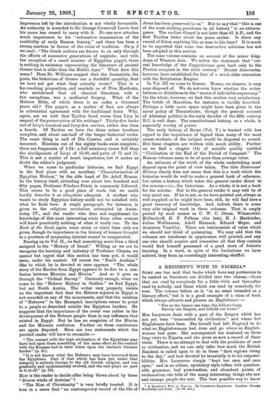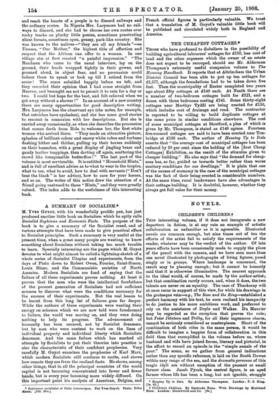A RESIDENT'S WIFE IN NIGERL4...
SOME one has said that books which have any pretension to be ranked as literature are divided into two classes,—those that are read by everybody for a little while and thereafter read by nobody, and those which are read by somebody for ever. The volume before us is "in no sense intended as a literary effort," but it is a good example of a class of book which always attracts and pleases an Englishman :— " Far as the breeze can bear, the billows foam,
Survey our Empire, and behold our home."
Mrs. Larymore deals with a part of the Empire which has not yet been "trammelled by civilisation" and where fen Englishmen have been. She herself had left England to do what no Englishwoman had done and go where no English- woman had gone. She accompanied her husband on three long visits to Nigeria, and she gives us now a record of these visits. There is no attempt to deal with the problems of race or civilisation, and we can only infer how much the British Resident is called upon to do in these "dark regions rising to the day," and how devoted he invariably is to his responsi- bilities. Mrs. Larymore simply "kept her eyes and ears open," and in an artless, epistolary style (often with question- able grammar, bad punctuation, and abundant points of exclamation) she tells of the many interesting things she saw and strange people she met. The best possible way to know • A Resident's Wife in Nigeria. By Constance Larymore. London : George Eoutledge and Sons. [7s. 6d. net.] and reach the hearts of a people is to discard railways and the ordinary routes. In Nigeria Mrs. Larymore had no rail- ways to discard, and she had to choose her own routes over rocky tracks on plucky little ponies, sometimes penetrating silent forests, sometimes open, grassy, park-like country. She was known to the natives—" they are all my friends "—as Uwamu, "Our Mother," the highest title of affection and respect that the African can offer to a woman. In one village she at first created "a painful impression." "The Headmen who came to the usual interview, lay on the ground, their heads wrapped tightly in their gowns, and groaned aloud, in abject fear, and no persuasion could induce them to speak or look up till I retired from the scene ! The scare subsided happily before we left, and they recorded their opinion that I had come straight from Heaven, and besought me not to permit it to rain for a day or two. I could but hope for the best, and felt relieved when we got away without a shower !" In an account of a new country there are many opportunities for good descriptive writing. Mrs. Laryrnore has the observant eye (she notes, for example, that ostriches have eyelashes), and she has some good stories to recount in connexion with her descriptions. But she is carried away occasionally, as when she describes the procession that comes forth from Bide to welcome her, the first white woman who arrived there. "They made an attractive picture, splashes of brilliant colour and snowy white robes and turbans dashing hither and thither, pulling up their horses suddenly on their haunches, with a great display of jingling brass and gaudy leather trappings, then darting off again, scattering the crowd like irresponsible butterflies ! " The last part of the volume is most serviceable. It is entitled "Household Hints," and is full of excellent advice as to what to wear in the tropics, what to use, what to avoid, how to deal with servants (" Don't beat the black" is her advice), how to care for your horses, and so on. The writer of this notice drew the attention of a friend going eastward to these "Hints," and they were greatly valued. The index adds to the usefulness of this interesting book.





















































 Previous page
Previous page